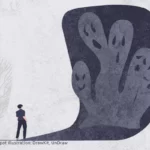
Depression has become a true epidemic worldwide. In Spain, it is estimated that 10% of people suffer from depression and in the United States, more than 2 million teenagers suffer from it. Epidemiological studies have found that cases of depression have not only increased in the last three decades, but that the physical symptoms of depression are also more intense.
However, the curious thing is that although depression is an increasingly common disorder, it has not been able to free itself from the stigma it carries. Many people continue to believe that depression is based on a lack of willpower, and others refuse to admit that they have a problem because they feel ashamed. Therefore, detecting depression in its early stages is complicated but, at the same time, essential, since this way its consequences can be tackled in time.
Unfortunately, the first symptoms of depression often go unnoticed, so we detect it once it has spread its tentacles over our lives.
The first symptoms of depression that we often don’t recognize
– Little appetite
– Sleep problems, almost always involving nighttime awakenings
– Lack of concentration in daily tasks
– Tiredness and fatigue without apparent cause
– Feeling overwhelmed or oversaturated, when demands have not increased
According to a study conducted at the University of San Diego, 74% of people who are later diagnosed with depression began to have problems falling asleep in the early stages of the disorder, 38% also had memory problems, caused by difficulty concentrating. 50% of people also admitted that they had been feeling overwhelmed and fatigued for a long time.
These are all classic symptoms of depression, but they usually go unnoticed because we believe that depression is only a feeling of sadness, apathy and loss of meaning in life. However, these are symptoms that appear when the disorder is already established.
Cognitive distortions: The lies depression tells us
In reality, depression is a great manipulator: it is capable of creating a negative scenario and story, presenting it in such a way that it is attractive to us. It sets a deadly trap for us by making us believe that the negative events we experience are an internal, stable and global state. It envelops us in its web by means of cognitive biases.
The most common cognitive distortions of depression are based on feelings of helplessness, hopelessness and inability to solve problems. In fact, although depression is classified as a mood disorder, it is actually much more than that, since it affects the functioning of the frontal lobes, which are linked to reasoning and purposeful behavior.
These cognitive distortions lead us to self-destructive behaviors, such as not seeking help, stopping medication or therapy, drinking excessively, or even physically harming ourselves.
The most common and harmful cognitive distortions linked to depression are:
– “If I have depression, it’s my fault.” In reality, no one wants to be depressed. Depression is not merely a psychological disorder but has its roots in biology, our family history and even our genes. Depression has nothing to do with willpower, so feeding these beliefs only serves to make us feel bad and feel guilty. In this way, depression creates a vicious circle that feeds it.
– “Nothing I do will make a difference, so why should I try?” Depressed people begin to give up control over their illness, thinking that they can’t do anything, and so they sink into a cycle of hopelessness and gloomy thoughts, which often lead them to entertain the idea of suicide. Small everyday actions become a huge effort that leads them to throw in the towel.
– “I will always feel this way.” Depression can be a very painful state, but the fact that we feel bad today does not mean that this suffering will last forever. In fact, most people who suffer from depression and seek treatment manage to improve within a few months. However, sinking into despair only serves to fuel the depressive condition.
– “I can’t find a way out of this.” Fighting depression is not easy because this disorder often hinders our ability to solve problems, makes us see everything in a grey light and locks us into a dead end. However, it is nothing more than an illusion, and a depressed person may have difficulty finding a way out but can ask for help. A psychologist or even a friend can help him find a more positive perspective.
Reference:
Twenge, J. M. (2014) Time Period and Birth Cohort Differences in Depressive Symptoms in the U.S., 1982–2013. Social Indicators Research; 121: 437–454.




Leave a Reply